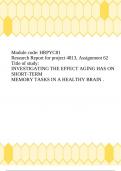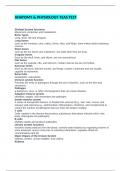Exam (elaborations)
Module code: HRPYC81 Research Report for project 4813, Assignment 62 Title of study: INVESTIGATING THE EFFECT AGING HAS ON SHORT-TERM MEMORY TASKS IN A HEALTHY BRAIN .
- Course
- Institution
Module code: HRPYC81 Research Report for project 4813, Assignment 62 Title of study: INVESTIGATING THE EFFECT AGING HAS ON SHORT-TERM MEMORY TASKS IN A HEALTHY BRAIN .Detailed working, solutions, memo, notes & explanations.Nicola-Anne Downes HRPYC81 Assignment 62, Project 4813 Student number:...
[Show more]




